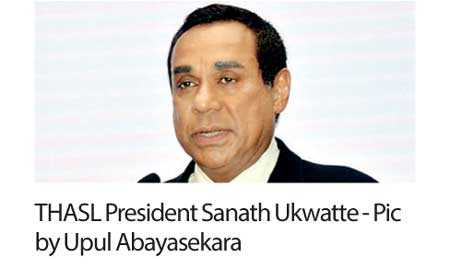Tuesday Feb 24, 2026
Tuesday Feb 24, 2026
Friday, 19 October 2018 00:00 - - {{hitsCtrl.values.hits}}

Putting forward key priority requests for tourism, the Hotels Association of Sri Lanka (THASL) this week called on the Government to recognise the sector as an export industry, provide tax relief, improve competitiveness and increase connectivity.
Speaking at its 53rd Annual General Meeting (AGM), THASL President Sanath Ukwatte outlined four key requests to Prime Minister Ranil Wickremesinghe for future development of the industry.
THASL’s four key requests include thattourism be treated and supported as an export industry, to legally regulate the informal sector and roll out the much-delayed destination branding and marketing campaign.
“The Tourism industry is on track to earn over $4.5 billion this year. We are Sri Lanka’s thirdlargest earner of foreign exchange and second biggest export industry according to the Central Bank. However, unlike in other countries, in Sri Lanka, for national accounting purposes, tourism is regarded as an invisible export. So I ask why are we not included as part of Sri Lanka’s export strategy? Why are we not offered the same benefits, opportunities as other export industries and treated as an export for tax purposes?”
THASLis the apex body which represents over 230 member hotels in the country with an estimated investment of $10 billion.Currently, tourism contributes 11.5% to the GDP, the second largest industry foreign exchange earner and provides employment opportunities to over 350,000 people both directly and indirectly.
Citing examples, he said the World Trade Organisation (WTO) members which includes Sri Lanka recognised tourism as an important export of services, while New Zealand has set up a Tourism Export Council and in Singapore, tourism falls under the Ministry of Trade and Industry.
“That’s right, tourism is an export industry. Exporting is when foreign consumers spend their income on domestically produced goods and services. It makes no difference whether it’s the goods that are shipped abroad or are bought by touristswithin the country, either way we earn foreign currency,” he added.
Ukwatte also requested the Government to abolish Nation Building Tax (NBT) for hotels and to introduce a fair, non-discriminatory, competitive and rational taxation policy forthe industry.
“In Sri Lanka our industry is taxed at the highest percentage on the top line revenue. If we take the service charge out of the equation we pay as high as 20% tax on our top line revenue alone. In our direct competitor markets, the tourism industry only pays 5-10% on the top line revenue as tax. This irrational and uncompetitive tax policy makes Sri Lanka a more expensive destination for travellers,” he pointed out.
He also claimed that currently, the municipalities and local governments are trying to impose a 1% tax on hotels based on turnover, in addition to the municipal rates and charges they pay already. “This is on top of the existing 20% tax on top line revenue that we are struggling to pay.We are battling this arbitrary and discriminatory tax in court as our industry has again been singled out against all other industries which are not subject to a similar tax.”
The THASL President also urged the lowering of liquor licensing fees and the introduction of rational, non-arbitrary, non-discretionary licensing policies and regulations that support the growth of the tourism industry.
In addition, Ukwatte proposed the Government introduce tourism zones, much like the export processing zones (EPZs) for the manufacturing industry, as part of the tourism export strategy, where licensing regulations are relaxed and opportunities are provided for the private sector to invest in hotels, entertainment and food and beverage services.
In terms of economic sustainability, he said research shows average occupancy levels at Colombo city hotels was around 60% and could drop to as low as 40% during the low season, resulting in hotels running at a loss.
“If the glut in hotel rooms in the city is not contained, continuing hotel losses will discourage new investment in the industry, resulting in a greater negative impact. We therefore call on the Government to impose a temporary postponement on new star-class hotel developments within the Colombo city area until such time as a proper comprehensive plan with goals for tourism development is in place and occupancy picks up,” Ukwatte said.
However, since the Government has stopped monitoring the imposition of the minimum price mechanism, he claimed that they had observed a number of hotels in the city, especially in the five-star category, drastically dropping their room rates, setting off a chain reaction affecting all other star-class hotels.
“While room rates have declined, we have not seen a corresponding increase in room occupancy. This is because occupancy is low due to excessive rooms and not because of higher rates. Therefore, the lower rates have not attracted more tourists to our city hotels but have deprived the country of the much needed income and staff of their service charge,” he added.
To expand regionally within the country and to make Sri Lanka a year around destination, he said the Government needed to encourage the private sector to join hands in developing infrastructure.
“Our members have built star-class hotels in the east coast with high expectations but today they are all suffering due to poor connectivity to these areas. All parts of our island have fantastic heritage and a great story to tell. The process of spreading regionally needs to be a key government policy and one that empowers local communities throughout the island.”